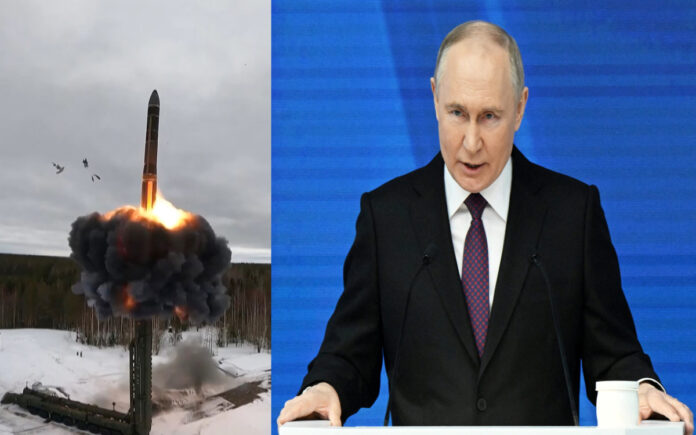London: NATO members, including the United Kingdom, are set to convene emergency talks amid escalating concerns over Russia’s deployment of hypersonic missiles. The meeting, scheduled for next week, comes after Russian President Vladimir Putin vowed to launch more nuclear-capable missiles into Ukraine, further intensifying fears of Ukraine’s front line nearing collapse.
Putin’s Hypersonic Missile Threat
Speaking on Thursday, Putin described the recent ballistic missile strike on Ukraine as a “successful” operation and pledged to carry out additional launches under “combat conditions.” In a televised address, he boasted about the Oreshnik hypersonic missile’s unmatched capabilities.
“There is no countermeasure to this missile due to its speed,” Putin claimed. The missile reportedly traveled from a launch site in northern Russia to a target in central Ukraine at Mach 11—over 8,500 mph—hitting an arms factory in Dnipro.
Putin emphasized the weapon’s potential: “I will add, there is no means of intercepting it, in the world today. And I will emphasise once again that we will continue testing this newest system.”
If mass production of the Oreshnik missile is achieved, as Putin asserted, it could alter the trajectory of the conflict, forcing Ukraine to surrender or prompting deeper NATO involvement.
Europe Under Threat
Russia’s Strategic Missile Forces Commander, Sergei Karakayev, underscored the missile’s capabilities, stating, “The Oreshnik missile system has characteristics that allow it to hit targets throughout Europe.” He added that the hypersonic system could effectively strike both individual and heavily fortified targets.
Ukraine Responds
Ukrainian President Volodymyr Zelensky addressed the growing threat, noting his country’s efforts to develop advanced air defense systems to counter Russia’s new hypersonic weapons.
UK missile expert Justin Crump suggested that the Oreshnik missile remains in an “experimental” stage, describing its use as a demonstration of Russia’s expanding technological capabilities.
Broader Context: UK Denies Kremlin’s Claims
The British government dismissed accusations from Moscow that the UK is “at war” with Russia due to its military support for Ukraine. Prime Minister Sir Keir Starmer reiterated Britain’s commitment to Ukraine, rejecting Kremlin allegations regarding the use of UK-supplied Storm Shadow cruise missiles in strikes against Russian targets.
“No, we’re not at war, but Ukraine certainly is, because Ukraine has been invaded by Russia,” Starmer said. “We cannot allow Putin to win this war.”
Also Read | Global Allies in Focus as Zaluzhny Declares Start of World War III
Growing Territorial Challenges
Concerns are mounting over Russia’s significant territorial gains in Ukraine. Reports indicate that Russia now controls more than 110,000 square kilometers of Ukrainian territory, compared to Ukraine’s occupation of just 1,100 square kilometers of Russian land in the Kursk region.
Defence researcher Dr. Marina Miron from King’s College London highlighted Ukraine’s recent incursion into Kursk province as tactically impressive but strategically detrimental. “The Kursk incursion was a moment of tactical brilliance but it has been a strategic catastrophe for Ukraine,” Miron said, suggesting the operation diverted troops from critical fronts.
Also Read | Israel Pounds Hezbollah Strongholds in Lebanon, Medics Among the Casualties
Global Implications
Meanwhile, Valery Zaluzhny, Ukraine’s UK envoy and former military chief, described the conflict as part of an emerging Third World War, citing the involvement of North Korean troops, Iranian drones, and Chinese technology.
As NATO prepares for urgent discussions, the international community watches closely, apprehensive about how the evolving missile threat could reshape the war and escalate global tensions.



